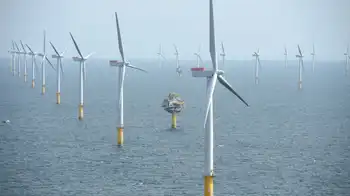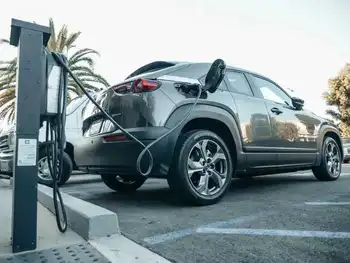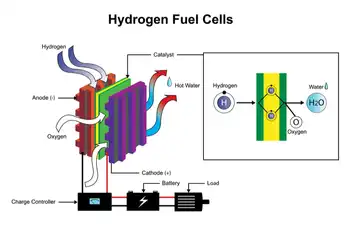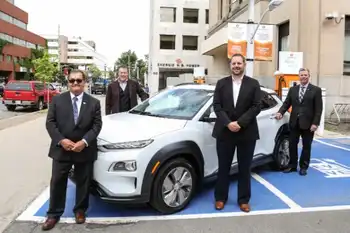Offshore chargepoint will power vessels with wind turbine electricity

NFPA 70e Training - Arc Flash
Our customized live online or in‑person group training can be delivered to your staff at your location.

- Live Online
- 6 hours Instructor-led
- Group Training Available
Offshore Wind Vessel Charging System enables renewable energy offshore charging from wind turbines, delivering clean power to electric vessels and crew transfer ships, boosting range, safety, and net zero maritime operations with reliable, efficient infrastructure.
Key Points
A turbine-mounted offshore charger delivering renewable power to electric vessels, extending range and improving safety.
✅ Turbine-mounted, field-proven offshore charging interface
✅ Delivers 100% renewable electricity to electric vessels
✅ Accelerates net zero, cuts maritime fossil fuel use
An offshore charging system will power vessels with 100% renewably generated electricity from wind turbines, aligning with projects like battery-electric high-speed ferries now advancing in the United States.
The system, developed by Teesside marine electrical engineering firm MJR Power and Automation, will be presented at the Global Offshore Wind event in Manchester (21-22 June), alongside interest in EV energy storage for buildings that could complement offshore charging solutions.
Known as the Offshore Wind On-Turbine Electrical Vessel Charging System, MJR says the chargepoints will provide efficient, safe and reliable transfer of clean power for crew vehicles and other offshore support vessels, while emerging vehicle-to-grid capacity on wheels concepts highlight the wider role of electric fleets.
“This innovation will break down the existing range barriers and increase the uptake by vessel owners and operators, as demonstrated by electric ships on the B.C. coast moving to fully electric and green propulsion systems for retrofit and new-build vessels,” an announcement said.
“In combination with other field-proven technologies, the charging system will be an important part for government and offshore wind owners and operators to achieve their net zero maritime operations targets, and switch away from fossil fuels, complemented by port initiatives such as all-electric berth at London Gateway now under development. The ability to charge when in the field will significantly accelerate adoption of current emission-free propulsion systems, which will be a major asset for the decarbonisation of the global maritime sector.”
The firm recently announced that construction and in-house testing of the system had been completed. The development project was part of the Clean Maritime Demonstration Competition, funded by the Department for Transport and delivered in partnership with Innovate UK, reflecting wider interest in reversing the charge to the grid for resilient energy systems.
MJR electrical engineer Mohammed Latif said: “Our system will be absolutely crucial in helping governments to deliver on their net zero carbon targets, supported by plans like new UK-Europe interconnectors that strengthen clean energy supply, and I am looking forward to demonstrating how it works and the benefits it offers.”
As part of the project, MJR Power and Automation led a consortium of partners – Ore Catapult, Xceco, Artemis Technologies and Tidal Transit – that all provided expertise.











